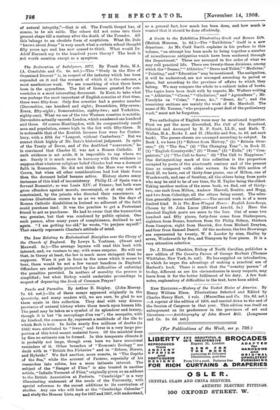Two anthologies of English verse may be mentioned together. First
we put the more diversified, The Call of the Homeland, Selected and Arranged by R. P. Scott, LL.D., and Bath. T. Wallas, M.A., Books I. and II. (Blackio and Son, is. 6d. net each book). The poems chosen are arranged according to subject. In Book I. we have (1) "Echoes from History," (2) " Britain Over- seas," (3) "The Sea," (4) "The Changing Year"; in Book II. (1) "English Countryside," (2) "Home," (3) "Exile," (4) "Com- patriots," (5) "The Call to Serve," (6) "The Call to Happiness." One distinguishing mark of this collection is the proportion occupied by poets of the nineteenth century and of the present time as compared with older. writers. In the fifth section of Book II. we have, out of thirty-four pieces, one of Milton, one of Wordsworth, and one of Southey, all the others being from poets who may be said to be of our time, Sir H. Taylor being the oldest. Taking another section of the same book, we find, out of thirty- two, one each from Milton, Andrew Marvell, Beattie, and Hogg, and two from Coleridge, all the others being recent. The selec- tion generally seems excellent.—The second work is of a more limited kind. It is The Rose-Winged Hours : English Love-Songs, Chosen by St. John Lucas (Edward Arnold, 5s.) Here the classical English poets are more to the fore. Out of some two hundred and fifty pieces, forty-four come from Shakespeare, eighteen from Donne, fourteen from Sir Philip Sidney, thirteen from Campion, eight from Herrick, five from Michael Drayton, and four from Samuel Daniel. Of the moderns, the two Brownings are represented by twenty, W. S. Lander by nine, Shelley by seven, Wordsworth by five, and Tennyson by four pieces. It is a very attractive selection.










































 Previous page
Previous page